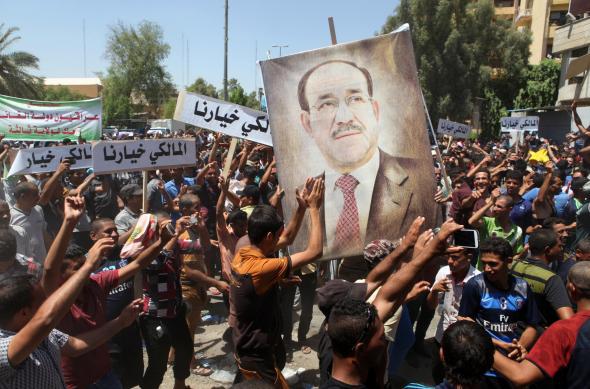The office of Iraq’s embattled prime minister, Nouri al-Maliki, announced on Thursday that he has agreed to step down from power, a decision that removes any lingering fears of a military coup in Baghdad at a time when the country is struggling to halt the advances of the Islamic State of Iraq and Syria.
“Maliki will withdraw the complaint against the president and will back the prime minister designate,” the outgoing prime minister’s spokesman, Ali Mussawi, told the AFP news agency. The news was also confirmed by state television, which announced on its news crawler: “Maliki steps down as prime minister in favor of Abadi.”
Maliki’s reversal comes only days after he sparked fears of a devastating, destabilizing coup following Iraqi President Fouad Massoum’s decision to tap Haider al-Abadi to form the new government. Maliki, who had long made it clear that he expected to serve a third term, reacted angrily to the snub, calling Massoum’s decision a violation of the constitution and deploying a number of elite security forces in the Green Zone in a clear display of power. He’d later walk back his implied military threat, but had nonetheless promised a legal challenge to Massoum’s decision to effectively end his reign as prime minister. As I explained earlier this week, any legal case Maliki had quickly fell apart once his State of Law coalition split its support between him and the man nominated to replace him. (Still, there was a reason Maliki expected to hold on to power despite the dubiousness of his legal claim: He’d managed to hold on to power at least once before by largely ignoring Iraq’s rather muddled constitution.)
Maliki’s decision to step down clears the way for Abadi to form a new government, one that President Obama and other Western leaders have expressed hope will be less sectarian and more inclusive than Maliki’s. The news also marks something of a second foreign policy victory in Iraq this week for Obama, who had made it clear that he expected Maliki to exit the stage but stopped short of explicitly making U.S. military support against ISIS a condition of him doing so.
The news comes on the heels of a similar victory for U.S. interests in Iraq, namely the Pentagon announcement that the combined gains made by U.S. airstrikes and Kurdish forces in northern Iraq had succeeded in rescuing thousands of Yazidis stranded on Mount Sinjar. This strategic and humanitarian win greatly reduced the chances that Obama would have to authorize a high-stakes rescue operation that would have risked a direct clash between American soldiers and the ISIS fighters who had forced the Yazidis from their home. “So the bottom line,” Obama said during a Thursday afternoon press briefing in Martha’s Vineyard, “is that the situation on the mountain has greatly improved and Americans should be very proud of our efforts.”
